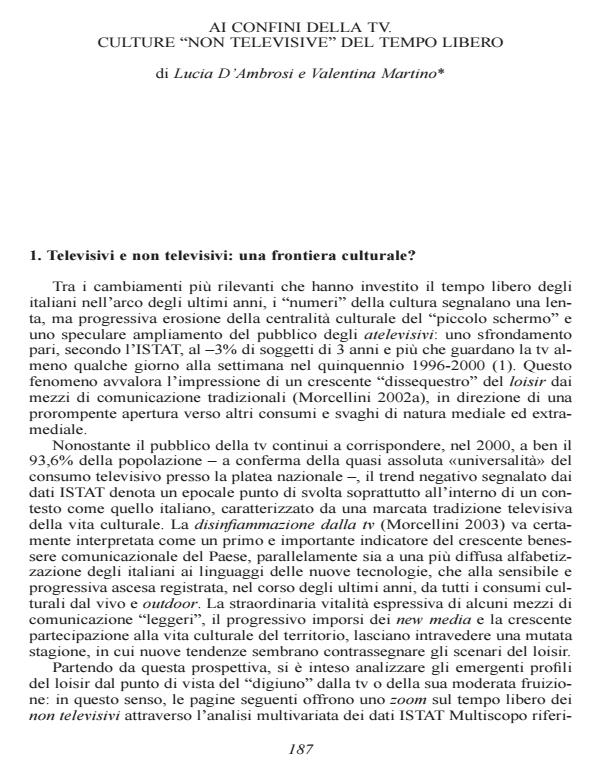Ai confini della tv. Culture non televisive del tempo libero
Journal title SOCIOLOGIA DELLA COMUNICAZIONE
Author/s Lucia D'Ambrosi, Valentina Martino
Publishing Year 2005 Issue 2004/35-36
Language Italian Pages 17 P. File size 73 KB
DOI
DOI is like a bar code for intellectual property: to have more infomation
click here
Below, you can see the article first page
If you want to buy this article in PDF format, you can do it, following the instructions to buy download credits

FrancoAngeli is member of Publishers International Linking Association, Inc (PILA), a not-for-profit association which run the CrossRef service enabling links to and from online scholarly content.
The data show that TV has been slowly but progressively leaving its central place in the leisure time of Italian people in the years 1995-2000. The number of non-TV (a/ipoTV) members of the audience has been paralelly increasing. The proposed analysis, realised at the Osservatorio sul tempo libero - Dipartimento di Sociologia e Comunicazione - Università degli Studi La Sapienza, Rome has shown that the less cultured social areas are primarily moving away from TV, even if the reasons why the subjects are put in a more o less marginal place into the TV mainstreaming are more complex and often deeply heterogeneous. In this case a multivaried Istat Multiscopo data processing has been useful. In the first of the three specific TV clusters, moving away from TV seems to be only a residual condition towards a general lack of cultural opportunities and relational spurs in the leisure time. In the second group of subjects, the weak daily TV consumption is strictly complementary to a media mix of clear generalist mark, and to a position of the subjects in extremely active and full social webs. In the third cluster, finally, moving away from TV seems to be a natural way of finding a landingplace for very advanced multimedia paths, where low levels of TV consumption result crowned in a fully incremental way by the affiliation to the new technologies and interactivity languages.
Lucia D'Ambrosi, Valentina Martino, Ai confini della tv. Culture non televisive del tempo libero in "SOCIOLOGIA DELLA COMUNICAZIONE " 35-36/2004, pp , DOI: